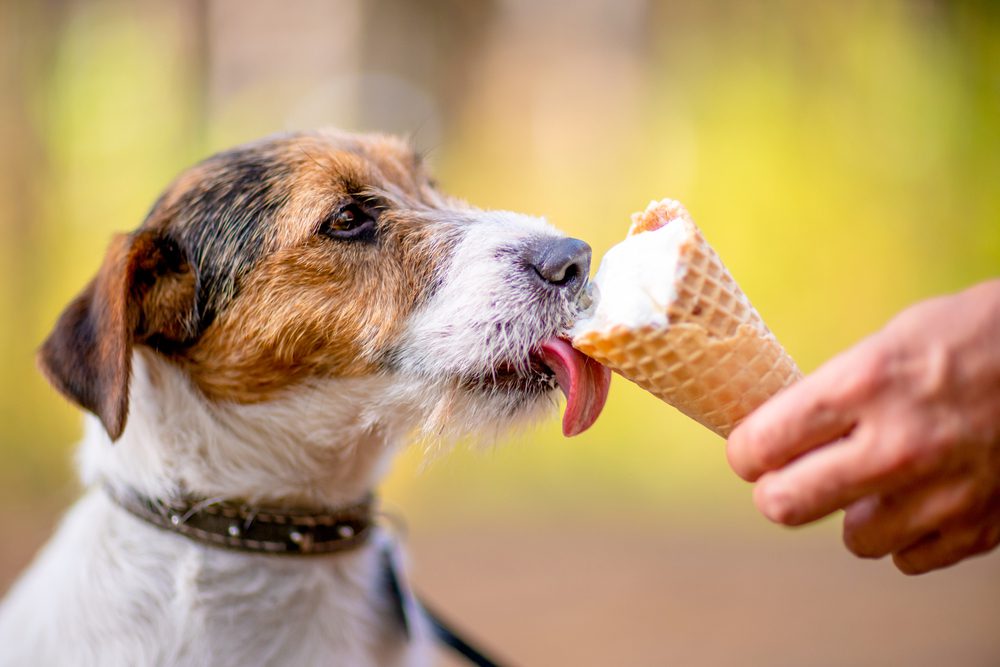Key Points
- Most ice cream isn’t toxic or dangerous for dogs, but it’s best to avoid giving it to them.
- Chocolate ice cream is very toxic to dogs, as are ice creams with the sweetener xylitol.
- The high sugar content in ice cream is unhealthy for dogs, and the dairy content can cause lactose intolerance issues.
There’s nothing like a scoop of ice cream covered in chocolate to de-stress after a long day — and if you’ve ever caught your pup eyeing your cone, you know how hard it is to say no to that sweet, hopeful face. You know your dog loves their pup cups, so why not share your dessert?
Before you share a lick, let’s hit pause: Can dogs eat ice cream?
The short answer: Not really. While the sight of a dog finishing off an ice cream cone might seem adorable, regular ice cream isn’t the best choice for dogs. It’s packed with sugar, which can lead to obesity, pancreatitis, and diabetes over time. Plus, many pups struggle with lactose intolerance, making dairy products a recipe for tummy troubles — and carpet-ruining tummy troubles.
But what if your dog gobbles up some ice cream without your permission? And are there any other frozen treats you can share with your pooch on a hot day? Let’s dive into why ice cream is a no-go and explore some dog-friendly alternatives that will have your pup wagging their tail in no time.
Why is ice cream bad for dogs?
While most ice cream isn’t toxic to dogs, it contains too much fat, dairy, and sugar to be a smart snack. This tasty treat just isn’t designed for your dog’s dietary needs. Some ice cream may also contain toxic ingredients for dogs such as chocolate or xylitol. A dog’s diet requires a healthy balance of protein, carbohydrates, and fats, and ice cream isn’t on the menu.
Can puppies eat ice cream?
Puppies, like adult dogs, should avoid ice cream. Their growing bodies have unique nutritional needs that don’t align with the high sugar, fat, and lactose content of ice cream. Feeding puppies ice cream can disrupt their diet, cause stomach upset, and potentially lead to long-term health issues.
The risks of feeding ice cream to dogs
So what happens if you feed your dog ice cream? Here are a few potential health risks if you regularly share this treat.
- Weight gain and obesity: Unhealthy weight gain and obesity can shorten dogs’ lifespans and cause major health complications.
- Risk of diabetes: The high sugar content in ice cream increases the risk of diabetes in dogs, a condition that requires lifelong management.
- Stomach problems: Many dogs are lactose intolerant, so eating ice cream can lead to stomach upset, diarrhea, and bloating.
- Toxic ingredients: Ice cream often contains toxic ingredients like chocolate, raisins, cherries, xylitol, and artificial flavorings that can be harmful (or even fatal) to dogs.
- Sodium: Some ice creams also have high sodium levels, which can cause severe dehydration and salt toxicity.
Dogs and lactose intolerance
Many dogs are lactose intolerant, which means they have trouble digesting lactose, the sugar found in milk and dairy products. Adult dogs produce less lactase, the enzyme needed to break down lactose.
While puppies usually produce enough lactase to digest their mother’s milk, the production of this enzyme decreases after they’re weaned, making it harder for adult dogs to process dairy.
If your dog is lactose intolerant, they may show symptoms like:
- Diarrhea
- Gas
- Bloating
- Stomach pain
- Vomiting
Not all dogs are completely lactose intolerant. Some can eat small amounts of low-lactose dairy products like yogurt or cheese without getting sick. However, it’s still best to limit dairy.
If you think your dog can’t handle lactose, always read food labels carefully to spot hidden sources of dairy, such as milk, cheese, butter, or cream.
Uh-oh. My dog ate ice cream. Now what?

Did your pup manage to sneak a lick of your soft serve when you weren’t looking? Or perhaps you just weren’t aware that ice cream is bad for dogs. If your dog accidentally eats ice cream, don’t panic — most ice cream is unhealthy but not poisonous. That means your dog may have an upset stomach, but they should be fine.
Follow these steps to ensure their safety.
- Check the ingredients: Look at the ice cream label for harmful ingredients.
- Monitor for symptoms: Keep an eye on your dog for signs like vomiting, diarrhea, gas, or unusual tiredness.
- Give them fresh water: Provide plenty of fresh water to help flush out any harmful substances.
- Contact your vet: If your dog’s symptoms continue or they don’t show signs of improvement, contact your vet for further advice.
Can dogs eat whipped cream?
We have to address the “Pup Cup” problem. While we can’t recommend that dogs eat dairy-based desserts like ice cream or whipped cream, we know that many pets go absolutely bananas in the Starbucks drive-through line. And who could deny their pup such a sweet treat?
So, can dogs have whipped cream or ice cream as a special treat? It’s best to avoid giving dogs these desserts, even as a treat. Opt for dog-friendly alternatives such as frozen fruit or yogurt-based pupsicles. Still, we know that many pet owners like to share “Pup Cups” with their dogs. If your dog already tolerates and enjoys these whipped cream desserts, then we’ll just have to look the other way if you decide to share the occasional lick with an extra good dog.
The best dog-friendly ice cream alternatives
If you want to treat your pup to a cool snack without the risks of regular ice cream, there are plenty of dog-friendly options available. These alternatives are lower in sugar and free from harmful ingredients.
Frozen yogurt: Choose options that are low in sugar and free from artificial sweeteners like xylitol.
DIY dog-friendly ice cream and smoothies: Get creative and make your own dog-safe popsicles, smoothies, and frozen treats using safe ingredients like plain yogurt, peanut butter, honey, vegetables, and blended fruits.
Dog-friendly ice cream brands: Some frozen treats are specifically designed for dogs and tailored to their health and taste. Some of the most popular dog ice cream brands on the market are:
More snack ideas for your dog
While ice cream isn’t safe for dogs, there are plenty of summery human foods that make excellent alternatives. For instance, try freezing blueberries or peaches and sharing them on a hot summer day. These treats not only help keep your dog cool but also provide hydration, vitamins, and a burst of flavor.
Pro tip: Blend these fruits and veggies with ice and plain yogurt for a dog-safe frozen smoothie. You can also pour the mixture into molds and make pupsicles.
Keep your pup cool, not sick
With all that sugar, dairy, and potential hidden hazards like chocolate, it’s best to skip sharing your scoop. Instead, treat your pup to dog-friendly frozen snacks that are safer and tailored to their needs.
Accidents happen, though — and when they do, it’s good to have a safety net. Pumpkin Dog Insurance plans can help provide coverage for eligible vet bills in the future, protecting your wallet when unexpected accidents — or snackcidents — arise.




